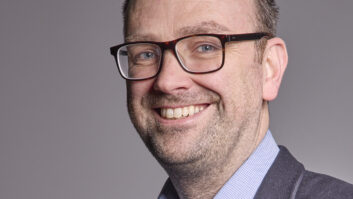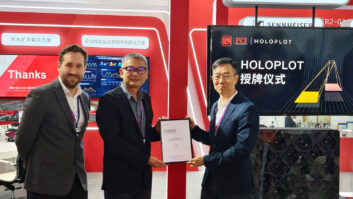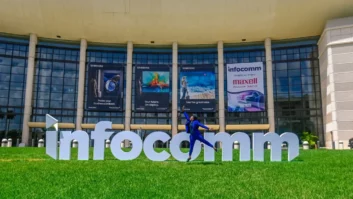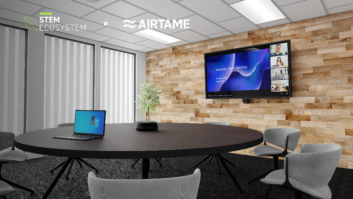Dr Randal A Lemke, PhD, retires at the end of December after 16 years with InfoComm. He became executive director and CEO of the organisation in 2000. Immediately prior to joining InfoComm, he held the post of director of the Extended Learning Institute at Northern Virginia Community College for seven years.
You’re retiring at the end of this year. Some people, when they retire, step away from their industry, while others are busier than before, with committees, consultancy and so on. What are your plans?
I’m in the first category. People have asked me if I’m going to come back to the InfoComm show in the US, and I always say I certainIy won’t next year and probably not the year after. The new person [new CEO David Labuskes] doesn’t need me around.
I’m looking at just retiring – I’m not looking for consulting or anything like that. My wife’s retiring on the same day. Who knows what we’ll do? We’re going to travel a lot, we’re going to do some things. In the future if I do anything for income, it would be something very different.
What would you say has been the biggest change in the industry during your time at InfoComm?
I started as executive director as most of North America and Europe were changing to become installation companies rather than selling boxes. In 2000, that change was underway: some companies were well into it, some weren’t, different parts of the world changed at different times. As an association, I think we did things with education, certification and shows to help that to happen.
But what has occurred in the last few years with AV and IT… that’s the change we’re undergoing right now. Using that whole network as a transport mechanism, that has changed [the situation] dramatically. So installations, instead of having four or five different devices, from DVD players to Laserdisc players to all the things we used to have media on, now it’s all coming through the network and it’s transferred – people are able to use the network to go everywhere. So that’s the biggest change in the industry.
Industry growth has come with that and it’s made us much more capable. Growth has also brought new people into the industry: IT companies, manufacturers like Cisco buying Tandberg, and even on the design and installation side, people that were traditionally in IT or telecoms are now working with AV. So the market has grown and looks like it’ll continue to grow for the near future.
Do you see the increasing influence of IT as entirely to the good, or are there downsides?
First of all, IT is our customer, and if you’re not seeing that, you’re missing out on the reality of who’s buying audiovisual equipment now. In corporate and university environments, that responsibility has shifted in many places from the facilities manager to the IT department. I think that’s very good – you’ve got departments with money and people that are interested in technology. They can be a great customer, but you have to be able to meet their ways of doing business, you have to protect their network security, protect their bandwidth and play by their rules.
If you look on the other side, people would be concerned that IT is going to be a provider of design and installation – and it certainly will be. That’s not really too different than where it’s been with, particularly, universities in the past, whose own audiovisual groups were doing – and still do – smaller jobs: not stadiums or big churches, but classrooms and things of that nature. I think IT’s going to be the same in that they’re going to have internal capability of providing AV services, but it’s a larger-growing pie all of the time. If you look at where the opportunity is, it’s still in highly engineered systems, where we have skills that IT doesn’t have. Not that they couldn’t learn them, but it’s not what they’re probably going to want to do: there’s only so many auditoriums in a building – it’s not worth them learning to do auditoriums if they’re only going to do two in their life.
How would you characterise the ways InfoComm as an organisation has changed over the past dozen years?
People in different parts of the world see InfoComm doing different things. In North America and Europe, especially the UK, we’re seen as a tradeshow provider as well as an organisation that brings education, certification and standards. In other parts of the world we’re known primarily as tradeshow people. Tradeshows are very important for the industry in getting products out around the world – that is how developing countries first see new products, in trade fairs of different sorts. InfoComm has used its tradeshows to do its other jobs and, frankly, to pay for them. Nobody makes money on standards, and certification is kind of the same, although there’s a little more money there. But we’ve been commercial enough to produce the revenue to do the sorts of things that an association should be doing for its members.
As an organisation our international budget, if you look at North America versus the rest of the world, it’s almost half and half now. So financially we’ve moved around the world in a way that we weren’t twelve years ago. We have a tradeshow in Asia, we participated in Photokina as a licensee, and now with ISE in particular in Europe, and in Russia with ISR, and here in Dubai, we’ve been able to run a series of tradeshows. They’re the forward outposts, they’re a rallying point. When we’re here – we did a roundtable yesterday for our members – it’s a place where members get together. So these little events are places where membership starts to form and grow. And it’s a great thing, it’s one of the things that we’re proud of being able to do. In a for-profit company you distribute profits; we can’t distribute profits but we distribute benefits.
We want to work with platforms that are world class. That’s why we went to an ANSI-ISO certification programme: instead of saying ‘we’re the best, we’re our own little body’, having an ISO accreditation has put a lot of stiffness in the argument. Incidentally, on our board it was Brian Pipe [of Arup] who put together how we could do a standards programme that didn’t tell manufacturers how to build products. Brian was the one who said, let’s just look at how well our systems work and perform. If we can get everybody to have systems that perform well, no matter what the equipment is, then we will have helped everybody in the industry. So those kinds of contributions are real important, and I’m personally pretty proud that they got started on my watch.
You mentioned tradeshows as forward outposts – do you think that that model will always hold true, with in increasing use of the internet, virtual tradeshows and so on?
I think that what started in the Middle Ages is probably going to continue! We always say that tradeshows have three components. One is of course product. But there’s also education, and that’s why we worked to have the strong education programme that we now have at ISE. And the third part is networking. Having people in the same physical spaces together, and seeing so many people and so many products so quickly, is not yet replicable with an electronic model. Maybe at some point it will, but the typical virtual tradeshow hasn’t been it at all. In the US, they’re practically gone, nobody’s even attempting them any more. Even Google really believes in having people in a room talking to each other, working together.
What about the collaborative technologies that we see increasingly these days?
You know, people ask me about videoconferencing and collaborative technology. I think that at some point in a business relationship they are the perfect tool – but they’re hardly ever the perfect tool when you start. If you and I were going to work together for the first time, or I wanted to sell you something, I’d want to be here with you – it’s that face-to-face relationship. Once we have a deal, once we have that relationship, then working virtually and collaboratively is fantastic, because you’ve got that human side of the equation already working.
So I have great use for the collaborative technologies – they’re particularly good for communicating one to one and one to a few. But as for human interaction at tradeshows, I think that’s going to be around a long time.
If you think back to, say, the 1960s and 1970s, there were lots of predictions of how technology would transform the world by 2000. Which is the biggest way which the world we’re in now differs from how people thought it would be?
It’s interesting, because as a child I went to two World’s Fairs in the US, in Seattle in 1962 and New York in 1964-65. Going to places like the AT&T pavilion… they were all about technology. I remember seeing a video phone for the first time – videoconferencing and satellite transmission. Nobody imagined the transmission capability that we have now, but there was this remote presence that people saw, and they saw connections – primarily then through satellite.
There were a lot of forward looks at technology that have come true, but they’re not exploited in the same way, they’re not as omnipresent. We’re not working 20 hours a week because of technology, we’re working 60 hours a week. There aren’t many technologies that haven’t come about – levitation for cars, rocket-powered jetpacks.
If you think about Western society after World War II, and in the US in particular, people bought white goods, washing machines and dryers and all of that, and for the first time it freed people, particularly women: it was the precursor of women being able to work outside the home. If you look at what’s gone on in China, more recently, it’s very similar. When I first started going to China, 13 or 14 years ago, their homes for the first time were getting appliances. And at that time you didn’t really see cars on the roads to any great extent – the only cars in China that regular people bought were Volkswagen Santanas, not a luxury car at all. Today their middle class is wanting to buy what the rest of the world is buying, in terms of technology and automobiles. The growth of the middle class – technology has helped it, it’s also been what the middle class has been looking for, maybe it’s a virtuous cycle. But technology’s never going to be a solution, it’s going to be a tool.
And I do think there’s been a progression. Take technology for transportation: the opportunity to live in a world of seven continents, though I haven’t been to Antarctica – I never would have imagined that when I was a young person. None of us could have known that we’d live in this environment where we’re in Asia, in Europe…. it’s quite phenomenal.
Obviously I’m a technology optimist, not a pessimist. There are certainly abuses of technology, but for the most part it’s been a liberating experience.
Finally, what do you think has been the most disruptive technology – the one that’s made the biggest change to our lives?
The internet has really been a great change. When I was a professor, when we used the internet, it was a collection of shared resources among universities. It was line driven, command driven, more akin to FTP sites than anything else.
The browser changed that dramatically: I think we’ve gone from an internet of resources, then the browser gave us an internet of people, and what’s going on now is an internet of devices. There are now probably more IP addresses for devices than there are for people. If you think of all these AV devices that are out there, and everything from heating and ventilating to all the other technologies, all of that is on the internet of devices. It’s very powerful, and we’ll see it anywhere from intelligent buildings where the devices are seen and heard, and you can control for energy and all sorts of things.
The internet has changed communication patterns too. I definitely think it’s been the most disruptive technology. And I’m an optimist, so I think it’s been disruptive for the good.







